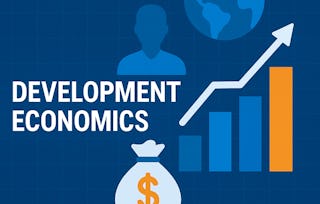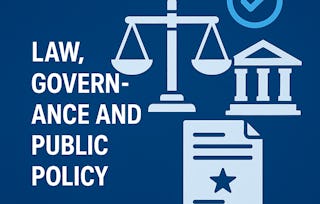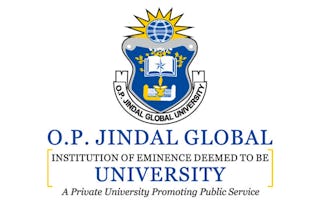This course is part of the SDG initiative <http://www.sdginitiative.org/> addressing the UN Sustainable Development Goals, specifically for the following SDGs [1, 8, 10 and 16]. We hope you will join in our efforts to reach the SDG’s in small but measurable and actionable ways, cooperating with Development Done Differently. Expand your impact. You can create a better world.

Political Economy of Institutions and Development
Ends soon: Gain next-level skills with Coursera Plus for $199 (regularly $399). Save now.

Political Economy of Institutions and Development

Instructor: Richard Thomas Griffiths
33,808 already enrolled
(389 reviews)
Skills you'll gain
Details to know

Add to your LinkedIn profile
See how employees at top companies are mastering in-demand skills

There are 10 modules in this course
Welcome to this course! Here we present the instructor and his team, what we will do in the upcoming modules, and what is exactly Political Economy. You play an important role in this module. We would also like to hear who you are and what are your expectations from this course. Don't forget to read before that our academic standards and tips and tricks that will help you succeed in this course. Good luck!
What's included
4 videos5 readings2 discussion prompts
Basic Data. Reviews the basic data of population, output and development used to make international comparisons between countries.
What's included
11 videos1 reading1 assignment2 discussion prompts
Trust. Argues for the centrality of trust in explanations of differences in wealth and poverty between nations but highlights difficulties in measuring it and in explaining the direct of causality.
What's included
6 videos1 reading1 assignment1 discussion prompt
Inequality and Fragmentation. Examines how society can be fragmented along lines of religion, language, ethnicity and income
What's included
9 videos1 reading1 assignment1 discussion prompt
Governance. Argues that good governance provides a transparent and stable environment for risk assessment and decision-making and contributes to welfare and growth. The question is how to get it.
What's included
8 videos1 reading1 assignment1 discussion prompt
Development Assistance. Assesses the motivations for development assistance but raises doubts about the extent to which it can overcome local issues.
What's included
4 videos1 reading1 assignment1 discussion prompt
Let us now focus on the international context of the elements we've seen so far. Globalisation - what is it really? What are the benefits it is supposed to confer and what is the role, if any, left for national governments in today's world?
What's included
8 videos1 reading1 assignment1 discussion prompt
International organization. What role do they play in the world economy?
What's included
4 videos1 reading1 assignment1 discussion prompt
Even though they do not belong to any establishment or an institution, certain non- governmental institutions can have a lot of power and influence. Who are those actors? How much power do they really have? We will dive into these question in this module!
What's included
8 videos2 readings2 assignments1 peer review1 discussion prompt
Not for the test - but very good for your general knowledge!
What's included
12 videos
Instructor

Offered by
Explore more from Governance and Society
 Status: Preview
Status: PreviewO.P. Jindal Global University
 Status: Preview
Status: PreviewO.P. Jindal Global University
 Status: Preview
Status: PreviewUniversità di Napoli Federico II
 Status: Preview
Status: PreviewO.P. Jindal Global University
Why people choose Coursera for their career




Learner reviews
389 reviews
- 5 stars
78.26%
- 4 stars
18.92%
- 3 stars
2.04%
- 2 stars
0.25%
- 1 star
0.51%
Showing 3 of 389
Reviewed on May 2, 2020
It's an good experience to learn thanking coursera for giving me this platform to showcase my interest and fulfilling by interest
Reviewed on Aug 17, 2024
The course and the professor is nice and good but the data and information is quite outdated.
Reviewed on Oct 25, 2021
The topics covered were very interesting and applicable to modern problems! It gives you some fundamental understanding to begin pursuing a career covering social issues.
Frequently asked questions
The book 'Configuring the World. A critical Political Economy approach' (April 2016) was written by Prof. Richard Griffiths and is available through all online bookshops (recommended ebook price is $5,95).
10% revenues will go to Handicap International for whom his daughter works in West Africa.
To access the course materials, assignments and to earn a Certificate, you will need to purchase the Certificate experience when you enroll in a course. You can try a Free Trial instead, or apply for Financial Aid. The course may offer 'Full Course, No Certificate' instead. This option lets you see all course materials, submit required assessments, and get a final grade. This also means that you will not be able to purchase a Certificate experience.
When you purchase a Certificate you get access to all course materials, including graded assignments. Upon completing the course, your electronic Certificate will be added to your Accomplishments page - from there, you can print your Certificate or add it to your LinkedIn profile.
More questions
Financial aid available,
¹ Some assignments in this course are AI-graded. For these assignments, your data will be used in accordance with Coursera's Privacy Notice.





